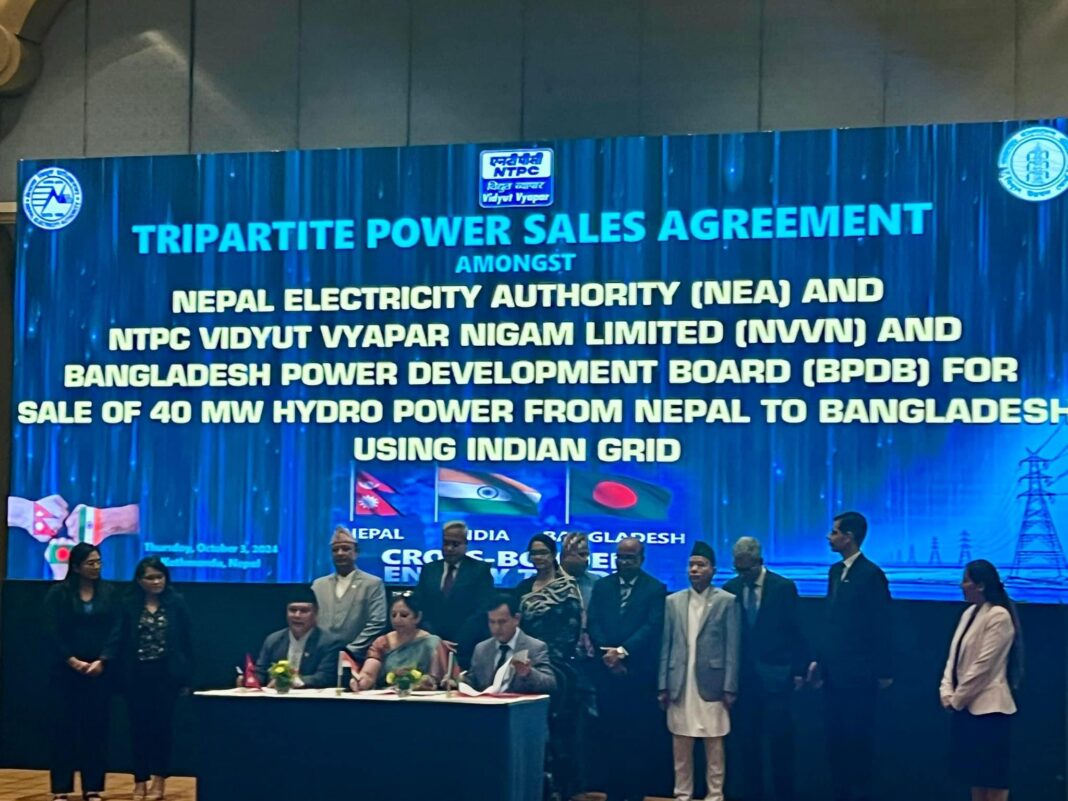Nepal has taken a major step in transforming its hydropower sector with a newly signed tripartite agreement with India and Bangladesh. This deal will allow Nepal to export 40 megawatts (MW) of electricity to Bangladesh annually, generating an estimated $9.2 million in revenue. The agreement highlights Nepal’s growing role in the South Asian energy market, where it is now poised to become a key player in meeting the region’s rising energy demands.
Key Details of the Agreement
Under this landmark deal, Nepal will send surplus electricity to Bangladesh during the wet season, from June 15 to November 15, using the Dhalkebar-Muzaffarpur 400 kV transmission line that runs through India. The price per unit of electricity has been set at 6.4 cents. India, which has been importing power from Nepal for several years, will act as a transit country, facilitating the transfer of electricity to Bangladesh through its territory .
This agreement is particularly important for Nepal, a country with immense hydropower potential, estimated at over 80,000 MW. However, only a small portion of this potential has been tapped into so far. The ability to export electricity marks a major economic opportunity, helping Nepal monetize its resources while contributing to regional energy security.
Economic and Strategic Significance for Nepal
For Nepal, the $9.2 million in annual revenue is only the beginning. The country is actively positioning itself as a regional energy exporter, a move that could lead to more significant deals in the future as its hydropower infrastructure continues to develop. This income provides a crucial boost to the country’s economy, which has been looking for ways to diversify its revenue streams and capitalize on its natural resources.
Beyond economic benefits, the agreement also enhances Nepal’s geopolitical standing in South Asia. By acting as a reliable energy supplier to its neighbors, Nepal strengthens its diplomatic ties with both India and Bangladesh. The deal also aligns with the global shift toward clean energy, which is essential for addressing climate change and ensuring sustainable growth .
Regional Collaboration and Future Prospects
This tripartite agreement represents a growing trend of cross-border collaboration in South Asia, where countries are increasingly looking to share energy resources to meet their mutual needs. The deal is part of a broader push for sustainable energy development in the region, and it could pave the way for even more ambitious energy-sharing projects in the future.
For Bangladesh, which is experiencing rapid industrial growth and rising energy demands, the imported electricity from Nepal provides a much-needed solution. The partnership also strengthens India’s role as a transit hub for electricity, adding to its strategic importance in the region’s energy infrastructure.
A Model for the Future
As South Asia continues to grow, energy cooperation will become even more critical. The success of this agreement could inspire similar initiatives, with Nepal potentially expanding its electricity exports to other neighboring countries. The deal underscores the potential for hydropower to drive economic growth and promote regional stability through clean energy collaboration.
Nepal’s increasing role as an energy supplier not only contributes to its economic stability but also promotes the broader goals of sustainable development and regional prosperity. This tripartite agreement is a significant step forward for Nepal’s energy ambitions and the region’s collective efforts toward energy security and green development.
A global media for the latest news, entertainment, music fashion, and more.




